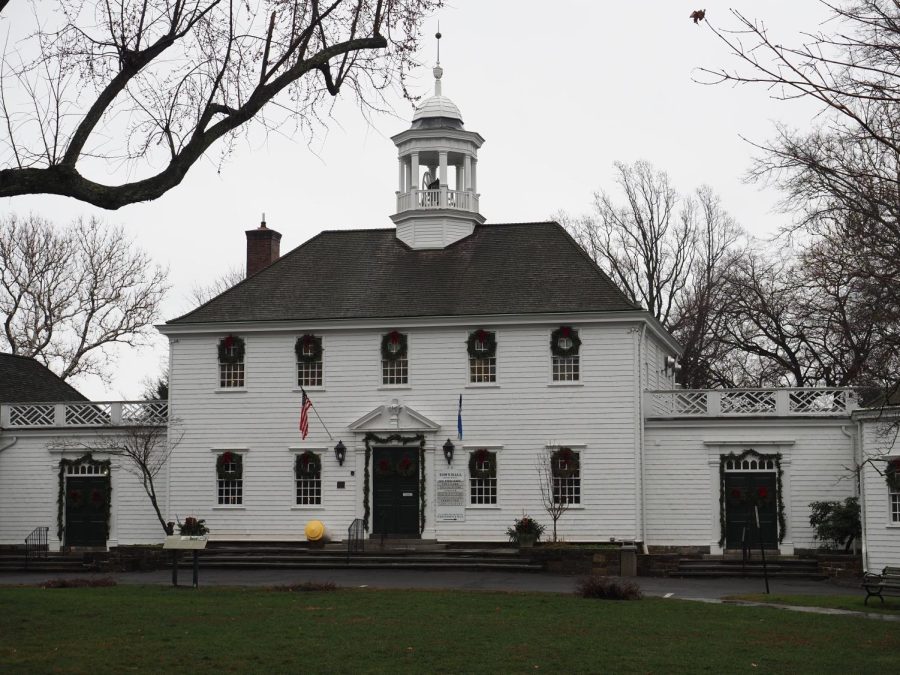Charting a New Future in Fairfield Government with Charter Revision
The Old Town Hall is a recognizable symbol of Fairfield governance. The writer interviewed First Selectwoman Brenda Kupchick at this location.
Created in 1947, Fairfield’s charter lays out the structure of the town’s government and elections, as well as the budget procedures. For the first time since 2006, the charter will be revised.
The Charter Revision Commission, established for the revision last year, consists of seven people appointed by the Board of Selectmen: three Republicans, three Democrats, and one unaffiliated member. Attorney Steven Mednick is assisting the committee in their revision process. The Commission’s part on the official town website can be found here, with meeting recordings and minutes, along with other information about the commission.
The charter revision process isn’t quick. Over this year, the Commission will listen to suggestions from other town boards and the public, then put together proposals for updates to the charter. The updates that are approved to the Board of Selectmen will be put on the ballot for residents to vote on in the 2022 election.
Periodic reviews of town charters are important. First Selectwoman Brenda Kupchick says that it is generally recommended for towns to review their charters every 10 years, with Fairfield’s last revision 15 years ago.
The Commission held a virtual public hearing on October 6th last year where members of the community could raise questions or proposals to the committee members. They have since held five virtual meetings, all viewable through the town website.
However, some people have raised concerns about the process and the board. In October’s public hearing, multiple town residents questioned the makeup of the board. Three of the members of the commission previously served on the Strategic Plan Committee, which proposed changing Fairfield’s government to a town council/mayor structure in a blueprint last year. “This is more than just making things that exist more efficient — this is probably doing away with generations of people’s experience with town government,” said William Gerber, who was on the Representative Town Meeting (RTM), Fairfield’s legislative body, at the time of the hearing.
Selectwoman Nancy Lefkowitz also expressed concerns about the diversity of the board. “The lack of diverse voices on this commission is a concern,” she said during the public hearing. “I hope you will take into account the racial equity and justice lens as you are making your comments as recommendations.”
Other topics brought up during the hearing were the importance of conservation, whether the town’s government is too large, and the importance of boards and commissions in the government.
In the meetings since the public hearing, the Commission has heard from elected officials, department heads, and the Board of Selectmen. Topics ranged from small wording changes and department specific changes to opinions shared on much larger topics such as the government size and structure.
“The form of government we have can be made more efficient,” said Selectman Thomas Flynn, saying that he wasn’t sold on changing the town’s government but he wasn’t against either. The size and structure of Fairfield’s government, particularly the RTM, was a big topic both with the Board of Selectmen and other officials.
Karen McCormack, a District 2 RTM member, was in favor of shrinking the RTM. “I found it to be inefficient,” she said. “I found for the most part we have the same 10-15 members engaging in debate and input.”
There was also opposition to the idea. Sharon Pistilli, a District 3 RTM member, opposed it on the grounds of representation. “I would argue that reducing the size of the RTM actually expands the amount of ground that you need to discover in order to actually speak with the constituents who are going to elect you, so therefore it becomes a far less representative government,” she stated.
The Charter Revision Commission has nine meetings scheduled for 2022, starting on January 13th. The full schedule can be found on the town website. The January 13th meeting will be centered around the Commission’s Work Plan and the budget process, with chances for public comment on the Work Plan. Later meetings this year are set to cover other topics, including town governance. All meetings are open to the public.
The work that the Commission is doing is very important, as it has the possibility to change a lot about Fairfield’s government. Public participation and awareness is essential.

Campbell is the News Editor at Prospect. This is Campbell's fourth year with the Prospect staff. Campbell is also on Ludlowe's Ultimate Frisbee team!






